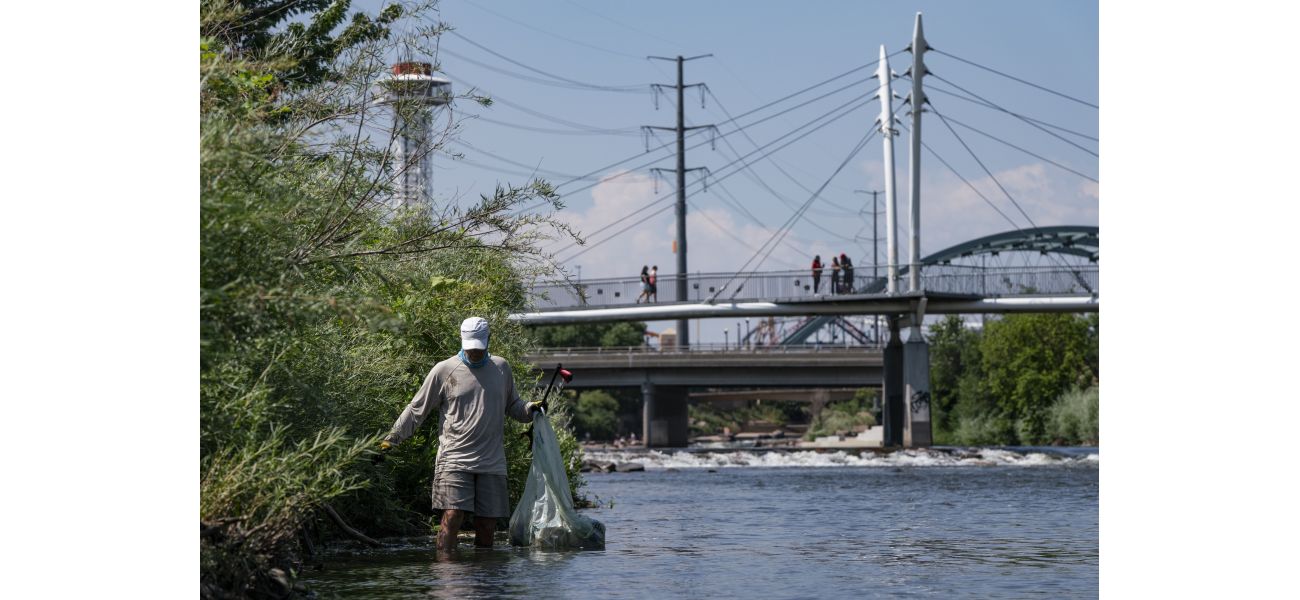Denver's South Platte River remains too polluted for swimming. Overcoming this obstacle is difficult.
Denver's South Platte River has gained attention for its environmental issues.
September 8th 2024.

As volunteers work to clean up the South Platte River in Denver, they come across a variety of discarded items along its banks. It's not just the typical trash like shopping carts and food wrappers, but also unexpected relics like car phones from the 90s and even guns. While efforts are being made to revitalize the river through development projects, the water quality still falls below state standards in many areas. In fact, some parts of the South Platte still have a distinct unpleasant odor. Despite former Denver Mayor Michael Hancock's promise to make the river swimmable, city health officials still advise against going in the water, especially during the summer months.
Jon Novick, the administrator of Denver's Department of Public Health and Environment's water quality program, emphasizes the importance of safety and encourages people to choose a swimming pool instead. He explains that even though the city has made significant progress in improving the river, there are still many environmental challenges that need to be addressed. This recent attention on the South Platte by developers, community leaders, and city officials has brought to light the various pollutants that continue to affect the river's health.
One of the main sources of pollution is the discharge of wastewater from treatment plants and companies such as Suncor Energy. Substances like inorganic nitrogen, arsenic, and PFAS compounds (also known as "forever chemicals") are released into the South Platte and its tributaries. Denver's health department has been monitoring these contaminants, as well as other factors like water temperature, acidity, and metals, for decades.
However, the biggest concern for the department is E. coli bacteria, which can cause infections and illness if ingested. Novick explains that this bacteria can enter the water through animal or human waste. Unfortunately, Denver's aging infrastructure means that sewage can sometimes leak into the river. Additionally, all of the city's stormwater flows into the South Platte, carrying with it pollutants from the streets, sidewalks, and even pet waste.
During the summer months, when people are most likely to want to take a dip in the river, E. coli concentrations increase as the water flows downstream. In the most recent water quality report published by the DDPHE, the South Platte was ranked as "fair," which is above "marginal" and "poor," but still below "good." In 2022, E. coli levels exceeded the standard set by the Colorado Water Quality Control Commission, and the river also exceeded the standard for arsenic, which is naturally occurring in the bedrock under the city.
On hot days, people like Victoria Britto head to the South Platte River at Confluence Park to cool off, but they may not realize the impact their everyday actions have on the river's health. The millions of people who live near the river contribute to its pollution by littering, using lawn fertilizers, and running off from roads. As part of its work, the Mile High Flood District helps local governments improve their stormwater management to prevent pollutants from reaching the river.
Holly Piza, the district's research and development director, notes some positive trends in the river's health, such as a general decline in nutrients like phosphorus and nitrogen. These nutrients, found in fertilizers, can cause algae blooms and harm the river's ecosystem. However, other water quality issues, such as salinity, are getting worse and can damage infrastructure and aquatic life.
To mitigate these problems, the city has implemented measures like bioretention ponds outside the Carla Madison Recreation Center. These ponds help filter water through the soil, rather than allowing it to flow directly into the river. Novick and Piza also urge Denverites to be more mindful of their actions, such as not using fertilizers with phosphorus or nitrogen, avoiding littering, and washing cars at a car wash instead of at home.
While the city is making efforts to improve water quality, Novick acknowledges that they can't do it all. He encourages people to stay informed and stay involved in the ongoing efforts to make the South Platte River a healthier and safer place for all.
Jon Novick, the administrator of Denver's Department of Public Health and Environment's water quality program, emphasizes the importance of safety and encourages people to choose a swimming pool instead. He explains that even though the city has made significant progress in improving the river, there are still many environmental challenges that need to be addressed. This recent attention on the South Platte by developers, community leaders, and city officials has brought to light the various pollutants that continue to affect the river's health.
One of the main sources of pollution is the discharge of wastewater from treatment plants and companies such as Suncor Energy. Substances like inorganic nitrogen, arsenic, and PFAS compounds (also known as "forever chemicals") are released into the South Platte and its tributaries. Denver's health department has been monitoring these contaminants, as well as other factors like water temperature, acidity, and metals, for decades.
However, the biggest concern for the department is E. coli bacteria, which can cause infections and illness if ingested. Novick explains that this bacteria can enter the water through animal or human waste. Unfortunately, Denver's aging infrastructure means that sewage can sometimes leak into the river. Additionally, all of the city's stormwater flows into the South Platte, carrying with it pollutants from the streets, sidewalks, and even pet waste.
During the summer months, when people are most likely to want to take a dip in the river, E. coli concentrations increase as the water flows downstream. In the most recent water quality report published by the DDPHE, the South Platte was ranked as "fair," which is above "marginal" and "poor," but still below "good." In 2022, E. coli levels exceeded the standard set by the Colorado Water Quality Control Commission, and the river also exceeded the standard for arsenic, which is naturally occurring in the bedrock under the city.
On hot days, people like Victoria Britto head to the South Platte River at Confluence Park to cool off, but they may not realize the impact their everyday actions have on the river's health. The millions of people who live near the river contribute to its pollution by littering, using lawn fertilizers, and running off from roads. As part of its work, the Mile High Flood District helps local governments improve their stormwater management to prevent pollutants from reaching the river.
Holly Piza, the district's research and development director, notes some positive trends in the river's health, such as a general decline in nutrients like phosphorus and nitrogen. These nutrients, found in fertilizers, can cause algae blooms and harm the river's ecosystem. However, other water quality issues, such as salinity, are getting worse and can damage infrastructure and aquatic life.
To mitigate these problems, the city has implemented measures like bioretention ponds outside the Carla Madison Recreation Center. These ponds help filter water through the soil, rather than allowing it to flow directly into the river. Novick and Piza also urge Denverites to be more mindful of their actions, such as not using fertilizers with phosphorus or nitrogen, avoiding littering, and washing cars at a car wash instead of at home.
While the city is making efforts to improve water quality, Novick acknowledges that they can't do it all. He encourages people to stay informed and stay involved in the ongoing efforts to make the South Platte River a healthier and safer place for all.
[This article has been trending online recently and has been generated with AI. Your feed is customized.]
[Generative AI is experimental.]
0
0
Submit Comment





